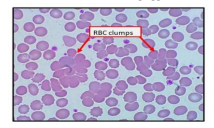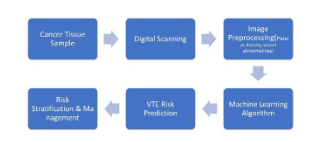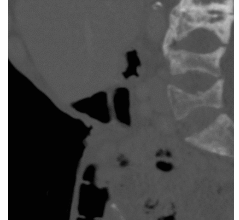
Keywords:
• Mycoplasma pneumonia
• Cold agglutinin
• CBC anomalies
• Hematology
• Cabin Crew
Introduction:
Mycoplasma pneumoniae is responsible for approximately 10-15% of community acquired pneumonia cases particularly high in closed environments such as schools, hospitals and airline. It may present with a variety ofextrapulmonary complications, including cold agglutinin disease. This immune mediated reaction causes red cell clumping at lower temperatures, often causing abnormal automated blood counts. Early recognition of this phenomenon can be challenging, particularly in primary care settings.
Case Presentation:
A 28-year-old female cabin crew presented with cough, low-grade fever, and breathlessness. Chest radiography suggested pneumonia. Her complete blood count (CBC) showed unusually high mean corpuscular hemoglobin
(MCH) and mean corpuscular hemoglobin concentration (MCHC), along with an analyzer flag indicating
turbidity/agglutination. Given these discrepancies, a peripheral blood smear was examined, revealing red cell clumping. The test was repeated after warming the sample, which normalized the parameters, confirming cold agglutinin activity. Given her occupation and respiratory picture, Mycoplasma pneumoniae
infection was suspected and confirmed with a positive IgM serology. Early initiation of clarithromycin therapy resulted in a rapid clinical recovery. This case demonstrates how a blend of clinical history, lab insight and technology come together to reveal an uncommon but important diagnosis. The detection of cold agglutinin disease through automated flags and confirmatory warm testing enabled an accurate diagnosis before severe complications developed. The occupational context is noteworthy: flight crew are frequently exposed to cold conditions, which may exacerbate symptoms and increase diagnostic complexity.
Conclusion:
This represents the first documented case in our facility where Mycoplasma pneumoniae infection was identified based solely on hematology findings. It strongly illustrates the invaluable role of peripheral smear evaluation in confirming cold
agglutination when automated CBC values appear inconsistent.



References:
[1] National Center for Biotechnology Information (NCBI) (2023) Mycoplasma Pneumoniae Infection.
[2] Centers for Disease Control and Prevention (CDC) (2023) Mycoplasma pneumoniae-Clinical Information. [3] Marchello C, Dale AP, Thai TN, Han DS, Ebell MH. Prevalence of Atypical Pathogens in Patients with Cough and Community-Acquired Pneumonia: A Meta-Analysis. Ann Fam Med. 2016 Nov;14(6):552-566
#UCJournals #UCJournalsResearch #UCJournalsPublication #AtypicalPneumonia #RespiratoryInfection #PneumoniaAwareness #Pulmonology #LungHealth #RespiratoryMedicine #InfectiousDiseases #MedicalResearch #Pathology #ClinicalDiagnosis #ChestInfection #PneumoniaTreatment #PulmonaryCare #RespiratoryHealth #MedicalEducation #HealthResearch #Pulmonologist #ClinicalPathology #LungInfection #RespiratoryIllness #CommunityHealth #MedicalUpdate #RespiratoryTherapy #PneumoniaResearch #InfectiousDiseaseResearch #ClinicalStudy #MedicalScience #PatientCare #MedicalJournal #PulmonaryResearch #InfectionControl #RespiratorySystem #HealthAwareness #MedicalInsights #LungDisease #RespiratoryDiagnostics #PneumoniaAwarenessMonth #PathogenDetection #MedicalCaseStudy #PublicHealth #ClinicalObservation #HealthcareResearch #MedicalFindings #LungCare #RespiratoryPathology #Microbiology #PneumoniaPrevention #MedicalUpdate2025 #RespiratoryStudies #HealthScience #MedicalKnowledge #AtypicalInfection



